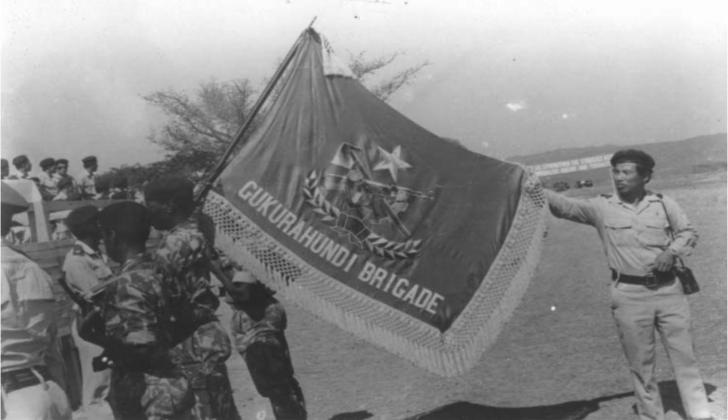News / National
Gukurahundi survivors call for apology before it's too late
21 Dec 2024 at 08:16hrs |
0 Views

As Zimbabwe marks the anniversary of the Unity Accord on December 22, survivors of the Gukurahundi atrocities have renewed calls for justice, compensation, and recognition for the horrors they endured during the 1980s mass killings in Matabeleland and Midlands.
Survivors expressed frustration to Southern Eye Weekender that decades after the signing of the Unity Accord between PF-Zapu and Zanu to end the killings, their plight remains unaddressed.
The massacres, perpetrated by the North Korea-trained 5 Brigade, targeted suspected PF-Zapu supporters and the Ndebele population. Research and survivor testimonies estimate at least 20,000 civilians were killed, leaving survivors with deep physical and emotional scars.
Charles Thomas, a survivor, called for an apology and compensation, saying many victims are still nursing injuries and coping with the loss of property stolen during the atrocities.
"The Unity Accord was only meant to stop mass killings of innocent people," Thomas said. "We need recognition in terms of an apology and compensation. Some of us lost everything. It's disheartening that our families have nothing to celebrate during the festive season while the government remains silent about our plight."
He pointed to Rwanda as an example of how governments can address atrocities. The Rwandan Gacaca system combined traditional and punitive justice to deliver accountability, truth, and reconciliation following the 1994 genocide.
Thomas shared his recent visit to Bhalagwe, a notorious Gukurahundi site, where shallow graves and exposed skeletons highlight the lack of resources and political will to properly honor the dead.
"The situation is pathetic. Some of the skeletons are in the open. We tried to fix the graves, but we lack resources," he said. "We need a dedicated day for survivors to gather, share their experiences, and pray for closure."
Stalled Efforts and Unfulfilled Promises
Zipra war veterans association deputy spokesperson Joakim Moyo expressed frustration at the government's lack of action.
"When we try to fix the mass graves where innocent souls are buried, we face interference from authorities," Moyo said.
President Emmerson Mnangagwa has tasked traditional chiefs with leading public hearings into Gukurahundi. However, progress has been stalled due to a lack of funding, with critics accusing the government of lacking the political will to address the atrocities.
As survivors age, their calls for justice grow more urgent. Many fear they may never see accountability or compensation in their lifetimes.
"We need closure," Thomas said. "The government must take our pain seriously before it's too late."
The Unity Accord's anniversary is a stark reminder of unfinished business in Zimbabwe's history, with survivors and advocates urging meaningful steps toward reconciliation and justice.
Survivors expressed frustration to Southern Eye Weekender that decades after the signing of the Unity Accord between PF-Zapu and Zanu to end the killings, their plight remains unaddressed.
The massacres, perpetrated by the North Korea-trained 5 Brigade, targeted suspected PF-Zapu supporters and the Ndebele population. Research and survivor testimonies estimate at least 20,000 civilians were killed, leaving survivors with deep physical and emotional scars.
Charles Thomas, a survivor, called for an apology and compensation, saying many victims are still nursing injuries and coping with the loss of property stolen during the atrocities.
"The Unity Accord was only meant to stop mass killings of innocent people," Thomas said. "We need recognition in terms of an apology and compensation. Some of us lost everything. It's disheartening that our families have nothing to celebrate during the festive season while the government remains silent about our plight."
He pointed to Rwanda as an example of how governments can address atrocities. The Rwandan Gacaca system combined traditional and punitive justice to deliver accountability, truth, and reconciliation following the 1994 genocide.
Thomas shared his recent visit to Bhalagwe, a notorious Gukurahundi site, where shallow graves and exposed skeletons highlight the lack of resources and political will to properly honor the dead.
Stalled Efforts and Unfulfilled Promises
Zipra war veterans association deputy spokesperson Joakim Moyo expressed frustration at the government's lack of action.
"When we try to fix the mass graves where innocent souls are buried, we face interference from authorities," Moyo said.
President Emmerson Mnangagwa has tasked traditional chiefs with leading public hearings into Gukurahundi. However, progress has been stalled due to a lack of funding, with critics accusing the government of lacking the political will to address the atrocities.
As survivors age, their calls for justice grow more urgent. Many fear they may never see accountability or compensation in their lifetimes.
"We need closure," Thomas said. "The government must take our pain seriously before it's too late."
The Unity Accord's anniversary is a stark reminder of unfinished business in Zimbabwe's history, with survivors and advocates urging meaningful steps toward reconciliation and justice.
Source - newsday
Join the discussion
Loading comments…

































